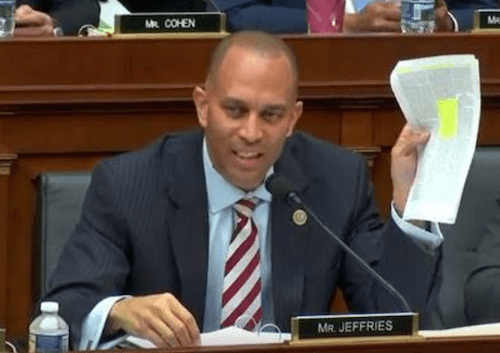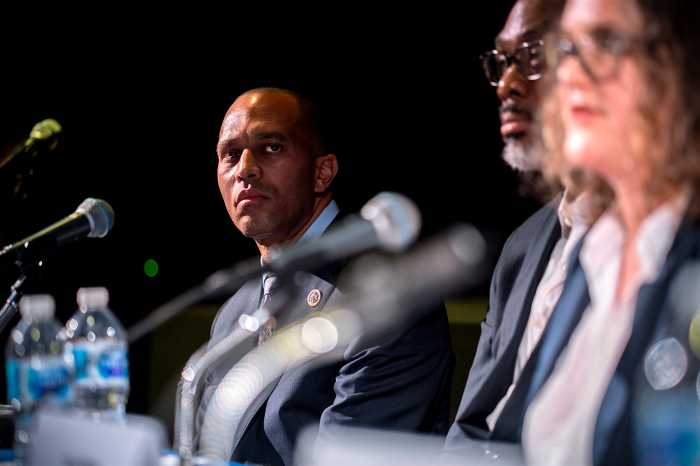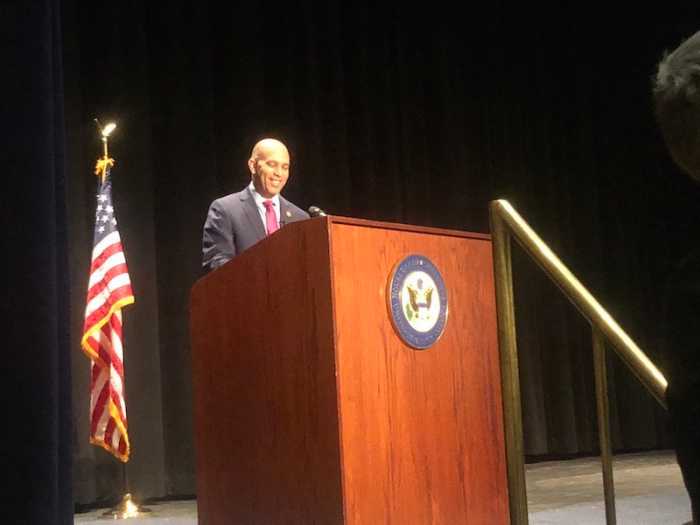U.S. Rep. Hakeem Jeffries (D-Fort Greene, Clinton Hill, Bedford-Stuyvesant, Canarsie, Mill Basin, East New York, Brownsville Coney Island, parts of Queens) announced yesterday that the bipartisan measure he co-sponsored helping formerly incarcerated people transition back into society passed the House Judiciary Committee, 25-5.
Dubbed the Formerly Incarcerated Reenter Society Transformed, Safely Transitioning Every Person Act (FIRST STEP), Republican Congressman Doug Collins (GA-9) was the other co-sponsor.
The bill, H.R. 5682, aims to propel formerly incarcerated individuals toward success when they return home, while enacting targeted reforms that would improve public safety and reduce recidivism. It also authorizes $50 million per year for five years to develop new programs, including education, vocational training and mental health counseling. As a result, newly-released individuals will be positioned to successfully re-enter society.

“The mass incarceration epidemic in America is a stain on our society that must be eradicated. Lives have been ruined, families torn apart and communities devastated. Today, we have taken a strong bipartisan step forward to address over-criminalization in America,” said Jeffries.
“H.R. 5682 will help thousands of incarcerated individuals get access to educational opportunities, vocational training and re-entry programming that will be transformative. The FIRST STEP Act represents the beginning of the end of over-criminalization in America,” he added.
Highlights of the bill include:
Good Time Credit Fix: A provision which will ensure that incarcerated individuals can earn the 54 days of good time credit per year that Congress intended, and not just the 47 days that BOP currently allows. This retroactively applies to all prisoners who have earned credit for good behavior. It has been estimated by BOP and GAO that fixing this will lead to the release of roughly 4,000 prisoners and save $40 million in the first fiscal year.
The Establishment of a Risk-Reduction System: This system, which is already used at the state level to best match inmates to programs fitting their needs, must be based on dynamic factors to best lower someone’s risk of recidivating over time. The bill mandates that the system must be statistically validated and must be evaluated to ensure that it does not result in unwanted racial disparities in order to address concerns about prisoners of color being disproportionately impacted.
Focused Resources on High and Medium Risk Prisoners: Evidence shows that this kind of programming has the greatest impact on those prisoners who are at the greatest risk of recidivating. To make the bill as effective as possible, it gives priority to high and medium risk inmates. People will be able to participate in such programming throughout their sentence.
Requirement to Move People Closer to Home: The journey to visit loved ones in prison can be extremely burdensome and cost-prohibitive for families. However, contact with family reduces recidivism. That’s why the bill mandates that prisoners shall be placed within 500 driving miles of their families.
Focus on Dignity for Women: Being pregnant while incarcerated can be a harrowing experience. There are far too few guarantees for the health and safety of both mother and baby. Egregiously, there is no federal ban on shackling pregnant and post-partum women. This bill implements such a ban starting from the moment that a woman is confirmed to be pregnant and extending three months beyond her pregnancy. In addition, the bill requires that BOP provide sanitary napkins and tampons to incarcerated women for free.
Requirement for Provisions of IDs: When transitioning back into society, many formerly incarcerated individuals find themselves without proper identification necessary to access essential services like housing, or to apply for employment. Assisting formerly incarcerated individuals with obtaining ID prior to release will reduce the collateral consequences of incarceration by allowing a quicker integration back into society, as well as create significant cost savings for BOP of approximately $19 million.
Compassionate Release: The current prison population is aging, causing significant challenges. This bill expands the compassionate release program by a 10-year requirement from the elderly release pilot program created by the Second Chance Act. This reduces the minimum age of prisoner eligibility for elderly release from 65 years of age to 60 years of age, and minimum time served of prisoner eligibility for elderly release from 75% to 2/3. It also expands the program to all prisons—not just one. Finally, it allows the prisoner to seek relief under the program directly from a court so that administrative hurdles do not hamper one’s ability to be released.
The bill will now advance to the floor of the House of Representatives for a full vote.










